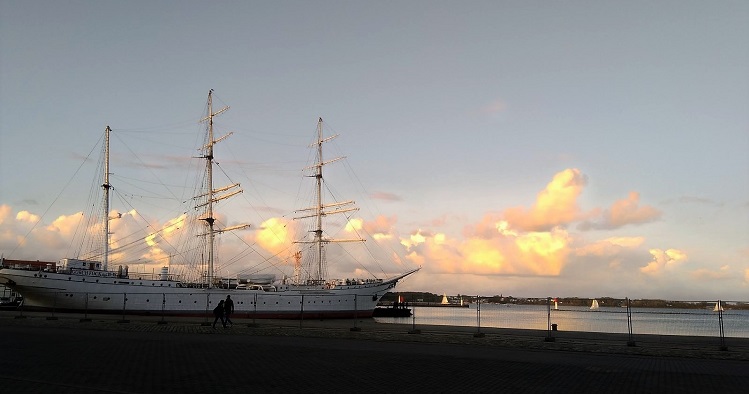25th Meeting of the Advisory Committee Concluded in Stralsund

View in front of the meeting venue, Ozeaneum, looking over to the sea. © Jenny Renell / ASCOBANS Secretariat.
Bonn/Stralsund, 20 September 2019 - The 25th Meeting of the ASCOBANS Advisory Committee (AC25) concluded yesterday in Stralsund, Germany. The productive meeting discussed key issues such as pollution, ship strikes, climate change, physical habitat change, Marine Protected Areas, cetacean watching industry, and recreational sea use.
The Advisory Committee recommended that applying the precautionary principle was of greater importance with Beaked Whales, as compared with other small cetaceans. Given the likelihood of small population sizes in Beaked Whales, and the overwhelming evidence that military activities can have severe impacts on these taxa, and acknowledging the difficulties encountered in gaining reliable information.
It is of particular interest to ASCOBANS to obtain an overview of the current scale of Marine Protected Areas (MPAs) and to review best practice approaches to their management in order to make recommendations to Parties, taking MPAs beyond being just ‘paper parks’. Therefore, it was requested that an international workshop be organized cetacean MPA management.
The Advisory Committee stated that it would be pleased to work with CMS and its Scientific Council, and ACCOBAMS and its Scientific Committee, to help identify and refine further measures, including concerted actions, for the Harbour Porpoise. The text of the CMS species listing proposal for the Harbour Porpoise and Iberian populations in the Baltic to be listed in CMS Appendices should be discussed in the 26th Meeting of the Advisory Committee, scheduled for 2021.
Noting that climate change effects on small cetaceans were not fully understood, Parties were encouraged to gather evidence and/or support research on distinguishing effects of climate change from those of other drivers considering the scales at which different pressures act. It was noted that Parties should consider cumulative impacts of all threats, including climate change, noting that it may be difficult to mitigate specifically against climate change effects. Because of changes in ecosystem dynamics due to climate change, there were changes in small cetacean populations’ distribution, abundance, and life history. Parties were requested to look in more detail into the drivers of distributional shifts in context of climate change of cetaceans and prey.
Parties were encouraged to ensure that early in the process of drafting maritime spatial plans, the impact of cumulative effects of various physical habitat changes, together with other pressures on the small cetaceans would be duly taken into account in order to effectively contribute to an ecosystem-based approach. Parties were further encouraged to apply urgently for European Maritime and Fisheries Funds (EMFF), which could be used to finance measures relevant for Natura 2000, marine biodiversity and Marine Strategy Framework Directive.
AC25 agreed that, for the 9th Meeting of the Parties (MOP9) in 2020, draft resolutions should be submitted on marine debris, resource depletion, the Baltic Harbour Porpoise, and ecosystems approach to examine the effects of pressures on small cetaceans. The meeting further decided that the Best Practice on Cetacean Post-mortem Investigation and Tissue Sampling -protocol and the CMS Family Guidelines on Environmental Impact Assessment for Marine Noise-generating Activities would be tabled for adoption for MOP9.
The full report of the AC25 will be available on the meeting website in due course.
Last updated on 04 November 2020


